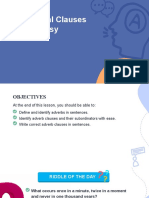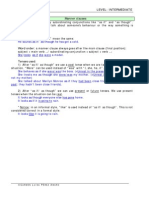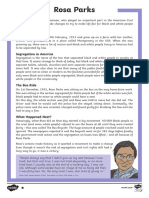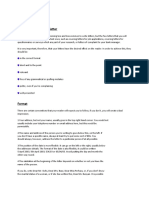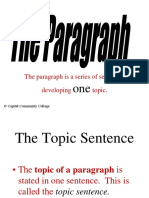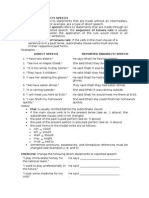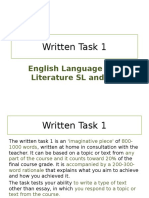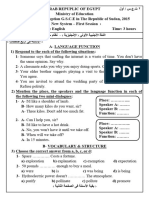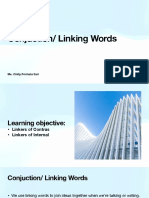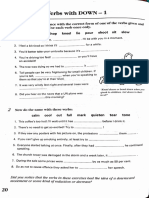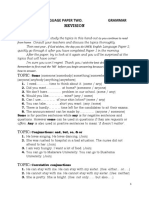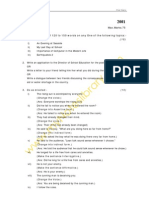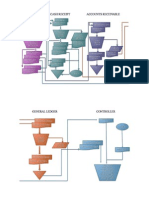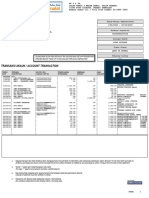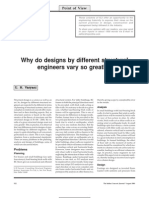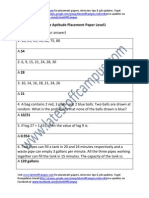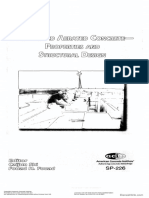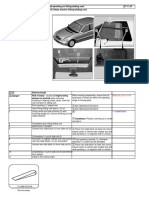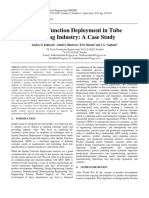University of Algiers 2, English Department/ Grammar/ 2nd year/ S3/ Teacher: DENIDNI
The Clause: Types and Function
A clause is a group of words having a subject and a finite verb which makes meaning.
It is essential that you know the functions and types of clauses.
You need to know that not all clauses can stand alone. Those that express complete thoughts and as
such can stand on their own are called independent/main clauses.
When a sentence is comprised of an independent clause/main clause alone, it is called a simple
sentence.
Those clauses that cannot stand on their own, in that they do not express complete thoughts, are
called dependent/subordinate clauses. Dependent clauses are usually introduced by subordinating
conjunctions such as if, unless, that, because, while, when, etc.
For a subordinate clause to express complete thought, it needs a main clause.
In the examples below, the underlined expressions are main clauses:
1. Odoabuchi is serious because she has a purpose.
2. They came when we did not expect.
iii. We love one another as our God enjoins us.
1. She believes in herself since she has good education.
2. However you do it, we will still appreciate your effort.
The underlined expressions below are subordinate clauses just as those not underlined above):
1. Odoabuchi is serious because she has a purpose.
2. They came when we did not expect.
iii. We love one another as our God enjoins us.
1. She believes in herself since she has good education.
2. However you do it, we will still appreciate your effort.
Apart from using the criterion of meaning to classify clauses, in which case we have main
/independent clause and subordinate/dependent clause, you can also classify clause using function as
a criterion. In this respect, you can still remember subordinate/dependent clauses. So, you should
know that there are three types of subordinate/dependent clause. The types include noun clause,
adjectival clause, and adverbial clause. We now discuss them one after the other.
1
� University of Algiers 2, English Department/ Grammar/ 2nd year/ S3/ Teacher: DENIDNI
Noun Clause
Noun clause is a subordinate clause used as a noun. You can identify it in a sentence by the
headwords such as that, what, whatever, when, and how. Noun clause can function as subject of a
verb or verb phrase, object of a verb or verb phrase, subject complement and object complement.
Below are examples of functions of noun phrase:
(i) That we greet you always does not mean that we are sycophants.
Subject of the verb phrase ‘does not mean’
(ii)Don’t let out what I want to do.
Object of the verb phrase ‘don’t let out’
(iii) A famous musician is what Sade wants to become.
Subject complement
(iv) The main problem now is when the members should meet again.
Object of the verb “is”
(v)They made the man who he is.
Object complement
Adjectival Clause
Adjectival clause is a subordinate clause used as an adjective. In other words, an adjectival clause is
a relative clause. You should know that adjectival clause modifies nouns, pronouns and noun
phrases in sentences.
The underlined expressions below are adjectival clauses.
(i) Those who respect me are many. Modifies the pronoun ‘Those’
(ii) One of the ladies that are brilliant in our class is proud.
Modifies the noun phrase ‘One of the ladies’
(iii) Those whom he invited did not come. Modifies the pronoun ‘Those’
(iv) The house which I built is the best around. Modifies the noun phrase ‘The house’
(v) The place where I am going is known only to me. Modifies the noun phrase ‘The place’
2
� University of Algiers 2, English Department/ Grammar/ 2nd year/ S3/ Teacher: DENIDNI
Adverbial Clause
Adverbial clause is a subordinate clause used as an adverb. Besides, you should know that adverbial
clause modifies only verbs or verb phrases that are in the main clause.
This is the only function it performs. Adverbial clauses are of different types.
The types and what they modify will be considered below.
(a) Adverbial Clause of Time
This answers the question “when”?
You should know that adverbial clause of time usually begins with when, after, before, while etc.
(i) He was provoked when the man asked for a bribe.
Modifies the verb phrase ‘was provoked’
(ii) When I saw him, I was perplexed. Modifies the verb phrase ‘was perplexed’
(iii) Before we responded, they had run away. Modifies the verb phrase ‘had run’
(iv) As at the time I was an undergraduate, she was not yet born.
Modifies the verb phrase ‘was not’
(b) Adverbial Clause of Place
This answers the question “where”
You can identify adverbial clause of place usually with where and wherever.
(i) Nobody knows where Nigeria is heading for. Modifies the verb ‘knows’
(ii) I am ready to sleep wherever you give me. Modifies the verb phrase ‘am ready to sleep’
(i) Where I will be tomorrow nobody can tell. Modifies the verb phrase ‘can tell’
(ii) He stays where the gods meet. Modifies the verb ‘stays
(c) Adverbial Clause of Reason
An adverbial clause of reason answers the question “why”?
You can identify adverbial clause of reason usually with why, because, etc.
(i) Because I did well they were happy. Modifies the verb ‘were’
3
� University of Algiers 2, English Department/ Grammar/ 2nd year/ S3/ Teacher: DENIDNI
(ii) She cried because she was jilted. Modifies the verb ‘cried’
(iii) Never leave an idea because nobody believes in it. Modifies the verb ‘leave’
(iv) I will make it because God is on my side. Modifies the verb phrase ‘will make’
(d) Adverbial Clause of Concession
This adverbial clause shows contrast between the main clause and the subordinate clause. The
markers of this clause include although, though, even though, etc.
However, you should note that but does not co-occur in a construction where these markers
occur. Examples include:
1. Although he prepared, he did not do well in the test. Modifies the verb phrase ‘did not do’
ii.Even though I know it, I won’t tell you Modifies the verb phrase ‘won’t tell’
(e) Adverbial Clause of Manner
This answers the question “how”?
You should be aware that adverbial clause of manner can be identified with such words as how, as,
as if, etc.
(i) He talks as if he knows everything. Modifies the verb ‘talks’
(ii) She dances as an insect does. Modifies the verb ‘dances’
(iii) They prayed as if only prayer could solve their problem. Modifies the verb ‘prayed’
(v) Constance thinks the way her father wants. Modifies the verb ‘thinks’
(f) Adverbial Clause of Condition
This gives the condition under which something or event will happen. You should know here too
that adverbial clause of condition can be identified with words such as unless, if, except, unless,
until, etc.
(i) Unless you are rightly connected, you may not make headway.
Modifies the verb phrase ‘may not make’
(ii) If you think you are the wisest person, you are the king of the fools.
Modifies the verb ‘are’
(iii) Except the masses voice out, the government may do nothing about their plight.
Modifies the verb phrase ‘may do’
(iv) Until we believe in the sanctity of human life, this society may not witness peace.
Modifies the verb phrase ‘may not witness’
(v)Provided you know him, you can consult him. Modifies the verb phrase ‘can consult’

